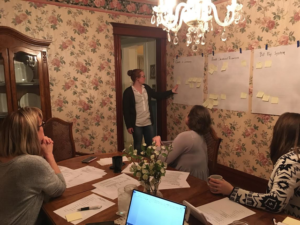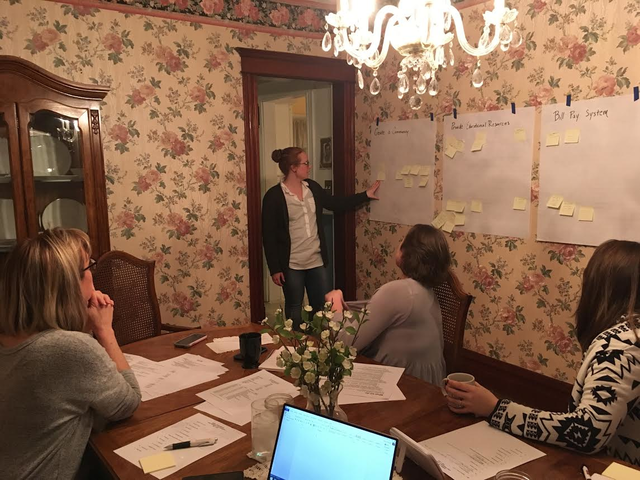
Just as Early Pregnancy Loss Association President Emily Carrington began to piece her life back together after her second miscarriage in 2014, she found in her mailbox a medical bill ordering her to pay for the procedures she experienced when her unborn child passed away.
“I didn’t think these bills were unjust in any way — I was paying for medical services,” Carrington said as she reflected on the miscarriage almost three years later. “I was angry. I didn’t want to pay that bill. It was just one more reminder of what we had been through that year, and I was just annoyed.”
Emily Carrington said she joked at the time with her husband Adam Carrington, an assistant professor of politics at Hillsdale College, that if she had all the money in the world, she would pay every medical bill received by a woman who had lost an unborn child. That sentiment did not fade, even as Carrington spent 2014 enduring these transitions and tragedies: She had quit her job fundraising for a museum, moved to Hillsdale, and mourned two babies she never got to cradle.
As the year went on, she considered life’s next step when an idea came to her. Carrington said she realized she alone would never have enough money to even slightly lighten the financial burden of women’s post-miscarriage hospital bills, which rack up costs in the thousands of dollars. But if she applied her experience in fundraising to her own endeavor to forgive medical expenses, perhaps what once was a pipe dream could become a reality.
“I wondered if there was a way we could do this,” she said.
Along with several friends in the Hillsdale area and a few members of her own family, Carrington founded the Early Pregnancy Loss Association in July 2016. The members plan to pursue their goal to pay medical bills in the future, once they build up a large network of donors and find a way to give money in an accountable and responsible fashion.
“This isn’t just raising a few dollars. Unfortunately, we can’t just take $100 and spend it on bills,” Carrington said. “We’ve started up and we’re doing a lot, but bill pay is not something we’re doing yet even though that was the spark and where we want to go.”
As EPLA moves toward its founders’ original aspiration, the nonprofit is making strides in educating women about miscarriage and building a community among those who have suffered.
EPLA recently distributed more than 75 informational folders around Hillsdale County to begin its education efforts. Light gray folders bearing EPLA’s logo, a purple tulip, now wait in the emergency room and obstetrics wing at Hillsdale Hospital, in the offices of local counselors, in the lobbies of crisis pregnancy centers.
“My goal is to have our folders anywhere where a woman might be diagnosed with a miscarriage and not know what to do,” Carrington said. “I want them in the hands of any care provider sitting in front of a woman grieving.”
Tucked inside the folder is a packet outlining different types of early pregnancy loss. The write-up includes important terms that women couldn’t grasp during the initial, overwhelming conversation with their doctors. Clean lines of text define terms like missed miscarriage, ectopic pregnancy, and molar pregnancy. The next page outlines how women should care for themselves physically and emotionally after their loss. The folder also includes a card of facts about miscarriage and lists a few myths about miscarriages.
Certified Nurse Midwife Amy Zoll, who works at Hidden Meadows OB-GYN, a clinic owned by Hillsdale Hospital, said before EPLA, the resources for women and families suffering from early loss were limited before EPLA began its work. When a patient loses a child, Zoll comforts her and hands her an EPLA folder as they prepare to face the outside world.
“We hold their hands, we hug them, we want to be there to do whatever we can to help them through that,” Zoll said. “I know that when we share this information with our patients, they are absolutely grateful. It has been very well received.”
EPLA Secretary Maria Servold, who also serves as the assistant director of the College’s Dow Journalism Program, said she she looks forward to seeing the nonprofit expand.
“It’s fun to think about what we can do in the future when we have an endowment and people apply for money. We’ll pay for their bills, we’ll have folders all across the country,” Servold said. “When someone goes through a miscarriage, they’ll have a place to go.”
Beyond bill pay and education initiatives, EPLA will also foster community among women and families who are coping with loss. But the organization is not postponing its work on this — the women of EPLA have already begun to cultivate community, both through their nonprofit and through their own lives.
Carrington, Zoll, and Servold each identified society’s failure to address, let alone properly address, miscarriage, and said community born through vulnerability will ease that burden.
“Whenever a star comes out and talks about her miscarriage, it’s still talked about as an act of bravery. The bravery is not that she’s surviving without her child. The bravery is that she told you,” Carrington said. “That’s not how we talk about any other death. If I were to announce to you that my grandma died, you wouldn’t call me brave. But we’re seeing that shift. We’re excited to be a small part of that.”
Carrington explained that most women and families refrain from announcing their pregnancies until they reach 12 weeks of gestation. Before 12 weeks, the chances of miscarriage are higher.
Carrington said she followed this advice for her first pregnancy.
“We didn’t announce until 12 weeks. We went to an appointment at about 11 weeks and found out the baby had passed,” Carrington said. “We were going to announce our pregnancy the next day. What we ended up doing was announcing our miscarriage the next day. And that wasn’t easy.
“In the end, we regretted that we never had a chance to celebrate the life of that child,” Carrington said.
It’s this vulnerability that Carrington has tried to live out personally as she tries to foster it in her organization.
“With EPLA, you have an avenue to express and share and maybe help somebody else get through the process, which I think is phenomenal,” Zoll said. “People can talk to each other rather than silently sit in pain.”
Members of the board of EPLA plan to attend the Pro-Life Women’s Conference in St. Louis this June to hand out their materials and network with other organizations. Carrington said the nonprofit’s vision — that all women and families are supported — will guide them as they grow.
“Someday, I really hope to see an organization that reaches wide and addresses pregnancy loss by bearing burdens,” Carrington said. “I want to see an organization that meets families in their weakest moments and provides them support, but brings them out of that and past that so they can move forward and move on.”
You can visit the EPLA Facebook page here: http://www.facebook.com/miscarriagecare/

